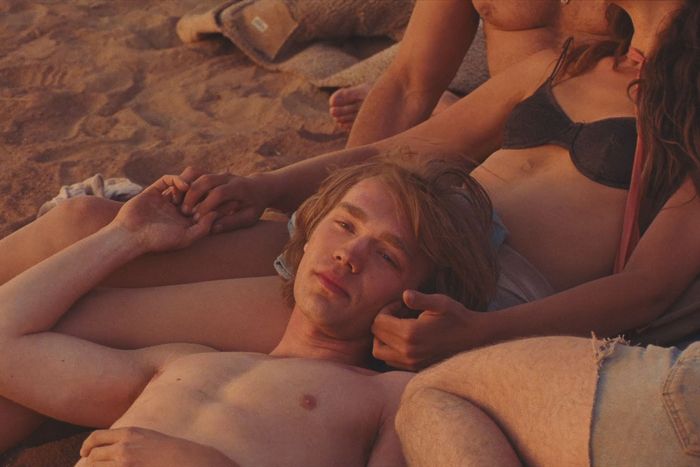
You’ve heard of the horse girl, but Hollywood has finally found its signature horse boy and his name is Charlie Plummer. (Apologies to Jeremy Irvine.) In Lean on Pete, the sensitive Andrew Haigh drama from 2018, Plummer played a soft-spoken Oregon teenager who escapes his strapped homelife when he finds work and a sense of community at a local racetrack. The new movie National Anthem, which premiered at South by Southwest on Friday, can be described in similar terms, except Plummer is a 21-year-old in rural New Mexico and the community he finds happens to be a queer rodeo enclave.
Plummer never actually rides a horse in Lean on Pete, but those noble mammals and the people caring for them make independence seem attainable. He gets bucked off the first horse he mounts in National Anthem, but what really matters exists beyond the paddock gates: a makeshift family that embraces Plummer’s gentle beanpole in a way his oft-absent mother (Robin Lively) cannot. The film is about outcasts who have refurbished the customs of the American West, bringing gender-agnostic glamour to scenery that traditionally attracts rugged men. One of the loveliest titles this year’s SXSW lineup has to offer, it’s a Lana Del Rey song in movie form, even though the Lana number of the same name does not appear. (The excellent soundtrack does include Perfume Genius, Angel Olsen, and Mazzy Star, though.)
National Anthem marks the debut feature from Luke Gilford, a 36-year-old photographer and filmmaker who in 2020 published an eponymous monograph documenting queer rodeo life across New Mexico, Texas, California, and elsewhere. His most striking image featured two men perched atop a horse wearing only cowboy hats — as compelling a thesis statement as any. In addition to magazine shoots starring Andrew Garfield, Lil Nas X, and Jane Fonda, Gilford has directed music videos for Troye Sivan, Kesha, and Blood Orange. Now he seems likely to become a hot indie wunderkind, descending from the likes of Haigh, Ira Sachs, Andrea Arnold, and Chloé Zhao. Gilford’s father was a Colorado rodeo champion, and the iconography he grew up witnessing has inspired his lush cinematic palette.
Gilford picked a fitting muse in Plummer, whose unassuming eyes yearn for experience. The All the Money in the World actor plays Dylan, a construction hand tasked with parenting his sweet young brother (Joey DeLeon) while his mom spends nights out. Dylan’s co-workers call him “pretty boy,” and he doesn’t have much in the way of friends, until he takes a gig doing handiwork on a ranch christened the House of Splendor. There, Dylan meets Sky (Eve Lindley, recently seen in Bros and Dispatches from Elsewhere), an equestrian who’s involved romantically with the ranch’s brooding chieftain (The Conners’ Rene Rosado) but takes an immediate liking to Dylan. Sky introduces him to drag and psychedelic mushrooms, gives him a home away from home, and encourages Dylan in his quest to buy an RV so he can travel the country.
Rodeos and cowboy culture have been a fascination among art-house filmmakers of late. National Anthem joins Zhao’s The Rider, Jane Campion’s The Power of the Dog, and Jacques Audiard’s The Sisters Brothers in dissecting the masculinity often deemed inherent to the Western genre’s landscapes. The Idris Elbra drama Concrete Cowboy, meanwhile, explored gentrification through the lens of Black wranglers in Philadelphia. That movie used the real-life Fletcher Street Urban Riding Club as inspiration, and National Anthem’s end credits thank the International Gay Rodeo Association, which Gilford photographed for his book.
National Anthem grants familiar coming-of-age beats a fresh backdrop. Most characters’ gender identity and sexuality aren’t defined, making the House of Splendor a sanctuary where nobody is tokenized in the name of representation. Gilford and his cinematographer, Katelin Arizmendi (Swallow), capture emotions in intimate close-up and use painterly wide shots to establish a vibrant sense of place. Splendor is a bohemian arcadia nestled among desert, removed from the mainstream in an act of defiance that requires little explanation. And yet their utopia is no fantasy — hearts break here, too.
This is but a chapter in Dylan’s biography. The rest of his life comes next, after National Anthem fades to black. When a nonbinary drag denizen (Mason Alexander Park) offers him permanent residence at Splendor, Dylan is wise enough to say he’s just passing through. He’s never experienced belonging before, and we’re left with the sense that he’ll go looking for more of that feeling as his 20s continue. Dylan’s new friends, bruised but hardly broken, have already found themselves. Now it’s his turn.
More From SXSW
- Jake Johnson Turned an Existential Crisis Into His Directorial Debut
- Will Daisy Jones & the Six Actually Go on Tour?
- The 22 Best Movies, Shows, and Videos to Watch This Weekend




